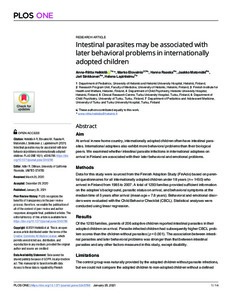Intestinal parasites may be associated with later behavioral problems in internationally adopted children
Raaska Hanna; Elovainio Marko; Heikkilä Anna-Riitta; Matomäki Jaakko; Sinkkonen Jari; Lapinleimu Helena
Intestinal parasites may be associated with later behavioral problems in internationally adopted children
Raaska Hanna
Elovainio Marko
Heikkilä Anna-Riitta
Matomäki Jaakko
Sinkkonen Jari
Lapinleimu Helena
Public Library of Science
Julkaisun pysyvä osoite on:
https://urn.fi/URN:NBN:fi-fe2021042822720
https://urn.fi/URN:NBN:fi-fe2021042822720
Tiivistelmä
AimAt arrival in new home country, internationally adopted children often have intestinal parasites. International adoptees also exhibit more behavioral problems than their biological peers. We examined whether intestinal parasite infections in international adoptees on arrival in Finland are associated with their later behavioral and emotional problems.MethodsData for this study were sourced from the Finnish Adoption Study (FinAdo) based on parental questionnaires for all internationally adopted children under 18 years (n = 1450) who arrived in Finland from 1985 to 2007. A total of 1293 families provided sufficient information on the adoptee's background, parasitic status on arrival, and behavioral symptoms at the median time of 5 years after arrival (mean age = 7.8 years). Behavioral and emotional disorders were evaluated with the Child Behavior Checklist (CBCL). Statistical analyses were conducted using linear regression.ResultsOf the 1293 families, parents of 206 adoptive children reported intestinal parasites in their adopted children on arrival. Parasite-infected children had subsequently higher CBCL problem scores than the children without parasites (p < 0.001). The association between intestinal parasites and later behavioral problems was stronger than that between intestinal parasites and any other factors measured in this study, except disability.LimitationsThe control group was naturally provided by the adopted children without parasite infections, but we could not compare the adopted children to non-adopted children without a defined parasite infection. We were unable to specify the effects associated with a specific parasite type. It was not possible either to include multiple environmental factors that could have been associated with behavioral problems in the models, which indicated only modest explanatory values.ConclusionsIn this study, intestinal parasite infections in early childhood may be associated with children's later psychological wellbeing, even in children who move to a country with a low prevalence of parasites. Our findings may support further developments pertaining to the gut-brain theory.
Kokoelmat
- Rinnakkaistallenteet [19207]
